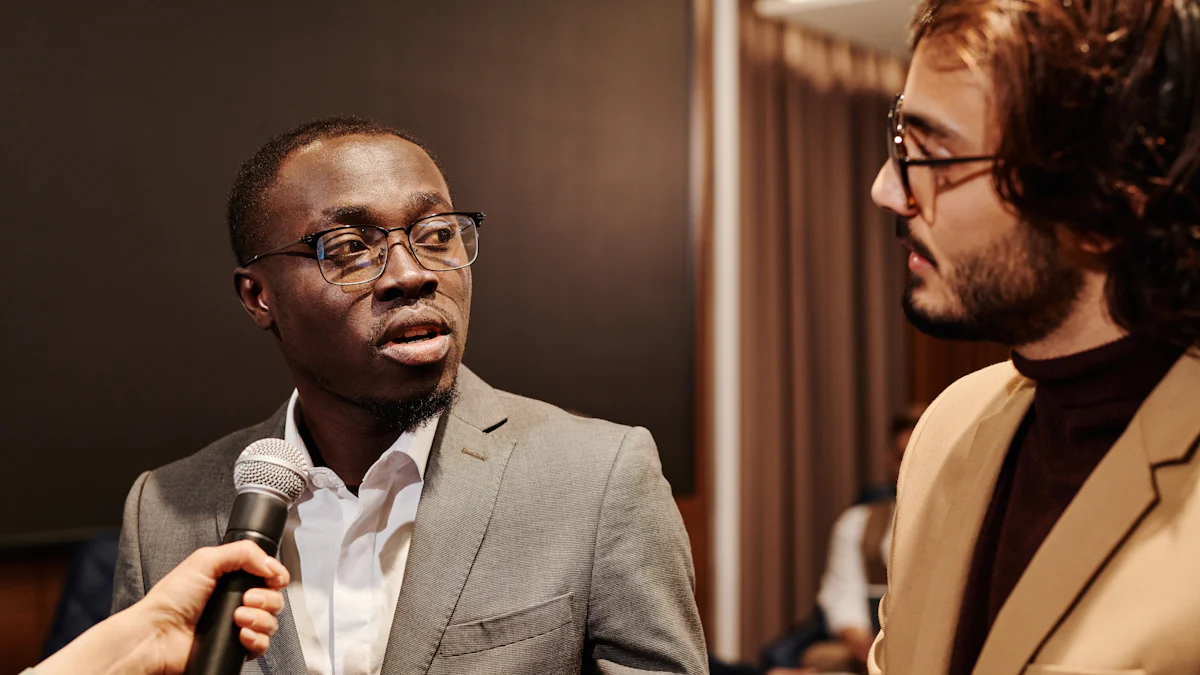Top 6 Mistakes to Avoid During a Job Interview
Try Aihirely for
Smarter Interview Prep
Experience real-time AI support tailored to your Resume.
Boost your confidence and ace every question with
AI Mock Interview.

Image Source: pexels
Job interviews can feel nerve-wracking, right? But here’s the thing—you have the power to make a great impression. Employers notice when you’re prepared, confident, and professional. Avoiding common pitfalls can set you apart from other candidates. In this blog, we’ll list 6 mistakes that can be made during an interview and help you steer clear of them.
Key Takeaways
-
Learn about the company before your interview. Knowing their goals shows you care and helps you answer better.
-
Practice typical interview questions to avoid long silences. Get ready with clear answers to impress them.
-
Get there 10-15 minutes early to look prepared. This shows you are on time and value their schedule.
Lack of Preparation
Failing to Research the Company
Walking into an interview without knowing anything about the company is like showing up to a test without studying. It’s a surefire way to leave a bad impression. Employers want to see that you’ve taken the time to understand their business, values, and goals. Skipping this step can make you seem uninterested or unprepared.
Why do so many candidates fail to research? Here are some common reasons:
-
They underestimate the importance of understanding the company and role.
-
They struggle with self-awareness, making it hard to connect their skills to the job.
-
They lack emotional intelligence, which affects their ability to engage with interviewers.
To avoid this mistake, spend time on the company’s website. Look at their mission statement, recent news, and even their social media. This knowledge will help you tailor your answers and show genuine interest in the role.
Not Preparing for Common Interview Questions
You know those awkward pauses when you’re trying to think of an answer? They happen when you’re not ready for the questions. Interviewers often ask similar things, so preparing ahead can save you from stumbling.
Here are some frequently asked questions you should practice:
| Question | Why It’s Asked |
|---|---|
| What is your approach to time management? | To see how you handle priorities. |
| Can you provide an example of how you handled a mistake at work? | To assess problem-solving skills. |
| How do you deal with pressure or stressful situations? | To evaluate your resilience. |
Rehearse your answers, but don’t memorize them word-for-word. Focus on being clear and confident. This preparation will help you stand out and avoid one of the most common mistakes candidates make during interviews.
Poor First Impressions

Image Source: pexels
Arriving Late or Too Early
Timing is everything when it comes to interviews. Showing up late can make you seem unreliable or disorganized. On the other hand, arriving too early can also create an awkward situation. It might make the interviewer feel rushed or unprepared. Both scenarios can hurt your chances of making a good first impression.
So, what’s the sweet spot? Aim to arrive about 10-15 minutes before your scheduled time. This shows you’re punctual without being intrusive. If you’re unfamiliar with the location, plan ahead. Use tools like Google Maps to estimate travel time and account for possible delays.
Running late? Call or email the interviewer as soon as possible. A quick heads-up shows respect for their time and might salvage the situation.
Dressing Inappropriately
Your outfit speaks volumes before you even say a word. Dressing too casually can make you seem unprofessional, while overdressing might make you look out of place. The key is to match your attire to the company’s culture.
Research the company’s dress code beforehand. For formal workplaces, stick to business attire like a suit or blazer. For more casual environments, smart-casual works well. When in doubt, it’s better to be slightly overdressed than underdressed.
Don’t forget the details. Clean, wrinkle-free clothes and polished shoes matter. Avoid flashy accessories or overpowering fragrances. These small touches show you care about the impression you’re making.
Remember, first impressions set the tone for the entire interview. Avoiding these mistakes can help you stand out and stay in the running for the job.
Ineffective Communication
Talking Too Much or Too Little
Striking the right balance in how much you talk during an interview can be tricky. If you ramble, you risk losing the interviewer’s attention. If you say too little, you might come across as uninterested or unprepared. So, how do you find that sweet spot?
Here are some tips to help you stay on track:
-
Actively listen to the interviewer and ask clarifying questions when needed.
-
Avoid interrupting. Let the interviewer finish speaking before you respond.
-
Focus on answering the specific question asked. Don’t go off on unrelated tangents.
-
Engage the interviewer by asking thoughtful, relevant questions about the role or company.
-
Take notes during the interview. This helps you remember key points and keeps your responses concise.
Remember, interviews are conversations, not monologues. Aim for a two-way dialogue where both you and the interviewer feel heard.
Speaking Negatively About Previous Employers
It’s tempting to vent about a bad boss or a toxic work environment, but resist the urge. Speaking poorly about past employers can make you seem unprofessional or difficult to work with. Even if your complaints are valid, they don’t belong in an interview.
Instead, focus on what you learned from past challenges. For example, if you left a job because of poor management, you could say, “I’m looking for a role where I can grow under strong leadership.” This approach keeps the conversation positive and shows you’re forward-thinking.
Employers want to hire people who bring solutions, not problems. Keep your answers constructive, and you’ll leave a better impression.
Neglecting Non-Verbal Cues

Image Source: pexels
Non-verbal communication can speak louder than words during an interview. Your body language and eye contact can either reinforce your confidence or send the wrong message. Let’s dive into two common mistakes you should avoid.
Poor Eye Contact
Maintaining eye contact shows confidence and engagement. If you avoid eye contact, you might seem nervous, distracted, or even dishonest. On the flip side, staring too intensely can make the interviewer uncomfortable. Striking the right balance is key.
Here’s a tip: Treat eye contact like a conversation. Look at the interviewer when they’re speaking, and glance away briefly to avoid staring. If you’re in a panel interview, shift your gaze naturally between the interviewers. This shows you’re attentive to everyone in the room.
Practicing with a friend or in front of a mirror can help you feel more comfortable. Remember, confident eye contact can leave a lasting impression.
Negative Body Language
Your body language can reveal a lot about your mindset. Certain habits can unintentionally send the wrong signals. For example:
-
Crossing your arms, which can seem defensive.
-
Leaning back in your chair, showing disinterest.
-
Touching your face, which might suggest nervousness.
-
Overusing hand gestures, making you appear frantic.
Instead, aim for open and relaxed body language. Sit up straight, keep your hands visible, and nod occasionally to show you’re engaged. A genuine smile can also go a long way in creating a positive connection.
Being mindful of these non-verbal cues can help you avoid one of the most common mistakes candidates make during interviews. When you combine strong verbal communication with confident body language, you’ll stand out as a polished and professional candidate.
Focusing Too Much on Yourself
Not Tailoring Answers to the Role
One of the biggest mistakes you can make during an interview is giving generic answers. When you don’t tailor your responses to the specific role, you miss the chance to show why you’re the perfect fit. Employers want to know how your skills and experience align with their needs. If your answers feel too broad, they might think you’re not serious about the position.
Why is tailoring your answers so important?
-
It shows you understand the company’s culture and values.
-
It addresses the specific concerns or goals of the interviewers.
To avoid this mistake, study the job description carefully. Think about how your past experiences connect to the role. For example, if the job requires leadership skills, share a story about a time you successfully led a team. This approach makes your answers more impactful and memorable.
Failing to Show Interest in the Company
If you focus only on yourself, you might forget to show genuine interest in the company. This can make you seem self-centered or unenthusiastic. Employers want to hire people who care about their mission and goals.
How can you demonstrate interest?
-
Research their recent projects or achievements.
-
Ask thoughtful questions about their future plans.
-
Use positive body language to show enthusiasm.
-
Address interviewers by their names to create a personal connection.
For instance, you could say, “I noticed your company recently launched a sustainability initiative. Can you tell me more about how this impacts your long-term strategy?” This shows you’ve done your homework and are excited about the opportunity.
Remember, interviews aren’t just about proving you’re qualified. They’re also about showing you’re genuinely excited to join the team.
Forgetting to Follow Up
Not Sending a Thank-You Note
You might think the interview ends when you walk out the door, but it doesn’t. Sending a thank-you note is a crucial step many candidates overlook. It’s your chance to leave a lasting impression and show your professionalism. A thoughtful note can set you apart from other applicants.
So, what makes a thank-you note effective? Here’s a quick guide:
-
Address the person properly.
-
Thank them for their time.
-
Mention a highlight from your conversation.
-
Show enthusiasm for the position.
-
Reinforce your top qualifications.
-
Keep it short and to the point.
-
Sign off professionally.
-
Send a personalized note to each person you met.
A thank-you note doesn’t have to be long. A few sentences that show genuine appreciation and interest in the role can make a big difference. Whether you send it via email or handwritten, make sure it’s timely—ideally within 24 hours of the interview.
Missing an Opportunity to Reiterate Interest
Following up isn’t just about saying thanks. It’s also a chance to remind the interviewer why you’re the best fit for the job. If you don’t express your continued interest, they might assume you’ve moved on.
In your follow-up, briefly mention why you’re excited about the role. Reference something specific from the interview, like a project or value that resonated with you. For example, you could say, “I’m especially excited about the opportunity to contribute to your team’s innovative approach to sustainability.” This shows you were paying attention and are genuinely interested in the company’s goals.
Don’t let the follow-up be an afterthought. It’s a simple yet powerful way to stand out and keep your name fresh in the interviewer’s mind.
Avoiding common interview mistakes can make a huge difference in your success. Remember these six pitfalls: lack of preparation, poor body language, inadequate self-presentation, failure to ask questions, neglecting follow-ups, and weak communication. Preparation and professionalism show your reliability and confidence. Apply these tips, and you’ll walk into your next interview ready to shine!
FAQ
What should you do if you don’t know the answer to a question during an interview?
Be honest. Say, “I’m not sure, but I’d love to learn more about that.” This shows humility and eagerness to grow.
How can you calm your nerves before an interview?
Practice deep breathing. Visualize success. Arrive early to settle in. Confidence grows when you prepare and remind yourself of your strengths.
Is it okay to ask about salary during the first interview?
It’s better to wait. Focus on showing your value first. If the interviewer brings it up, answer honestly but tactfully.
